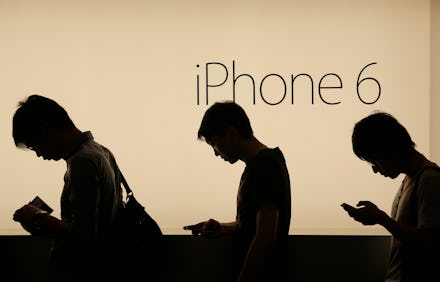The New iPhone's Best Feature Is One the NSA Will Hate

The news: The NSA is about to run into some big problems with the iPhone 6, and it's all thanks to Apple.
The tech giant's newest toy, the iPhone 6, was built with encryption in mind. It protects emails, photos and contacts with the help of a unique mathematical algorithm — one created by the person using the phone and unknown to Apple itself. Now, if a court orders Apple to divulge the contents of a particular phone, all it will get in return is a garbled mess of numbers and letters; according to the company, it could take up to five and a half years to crack the code without the phone owner's permission.
This, of course, poses a problem for the country's various security agencies, which haven't previously dealt such a high level of encryption. "What concerns me about this is companies marketing something expressly to allow people to hold themselves beyond the law," James B. Comey, director of the FBI, reportedly said at a press conference on Thursday.
Comey argued that certain activities — kidnappings and acts of terror, for instance — will be harder to catch now that investigators don't have easy access to smartphones. "The notion that someone would market a closet that could never be opened — even if it involves a case involving a child kidnapper and a court order — to me does not make any sense," he said.
It's not surprising that they're displeased. The Communications Assistance for Law Enforcement Act, the 1994 decision that required telecom companies to include an option for wiretapping into their services, does not include smartphones. Nevertheless, the NSA and other agencies have made good use of the devices; according to a recent leak by Edward Snowden, the NSA used apps like Angry Birds and Candy Crush to get access to data.
But Apple isn't a government agency; they're a business. And according to CEO Tim Cook, their business model isn't centered around divulging customer data to the government. As the New York Times writes, "Surviving in the global marketplace — especially in places like China, Brazil and Germany — depends on convincing consumers that their data is secure."
And on top of that, while the NSA can claim they need access to our smartphones for our protection, giving an agency like the NSA (one with a blemished track-record of using citizens' private data) unfettered access to private smartphone data isn't exactly something most people find exactly "welcoming."
Given that this is the first device that doesn't indirectly cater to the NSA's snooping ways, there's no way to know how it will turn out. Grab the popcorn, because this may just turn into a battle between Apple and the NSA.
h/t New York Times